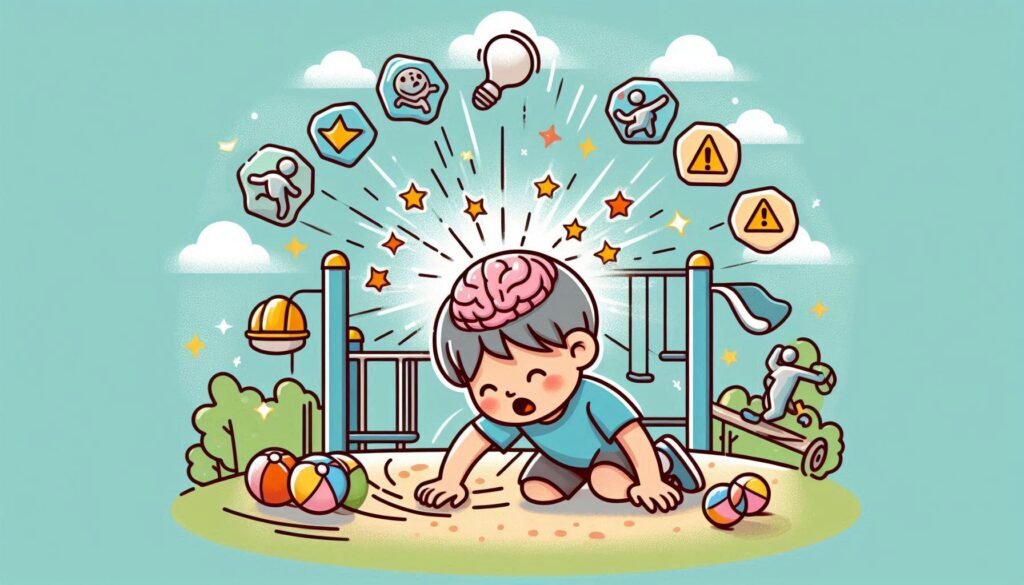Concussions have become a hot topic, especially in sports and contact activities. With an increasing number of athletes experiencing multiple head injuries, the focus is shifting towards understanding their long-term effects. One critical aspect gaining attention is cognitive reserve depletion in multiple concussions. But what exactly does this mean?
Cognitive reserve refers to the brain’s resilience against damage or injury. It acts as a protective buffer that helps individuals maintain cognitive function despite adverse events like concussions. As we explore the implications of repeated head trauma, it’s essential to grasp how cumulative impacts can influence overall brain health.
This journey will delve into various factors affecting cognitive reserve, examine neuroimaging evidence linked to concussion histories, and highlight strategies for bolstering brain health after sustaining injuries. Whether you’re an athlete, coach, or concerned individual, understanding this topic may prove invaluable not just for immediate care but also for long-term cognitive well-being. Let’s dive deeper into how our brains respond to repeated traumas and what we can do about it!

Defining Cognitive Reserve: A Buffer Against Brain Injury
Cognitive reserve is a concept that refers to the brain’s ability to cope with damage while still maintaining function. It acts as a protective buffer against cognitive decline, particularly in the face of neurological insults like concussions. Essentially, individuals with higher cognitive reserve can better withstand injuries without exhibiting noticeable cognitive deficits.
This resilience stems from several factors, including education level, occupational complexity, and engaging in mentally stimulating activities throughout life. People who consistently challenge their brains—through learning new skills or solving complex problems—tend to build a more robust cognitive reserve.
Research indicates that those with greater cognitive reserves often show milder symptoms after sustaining head injuries compared to others. This suggests that building mental flexibility may offer some degree of protection against the adverse effects of multiple concussions.
Understanding these dynamics helps illuminate why some individuals experience severe consequences following repeated head trauma while others do not. The interplay between cognitive reserve and brain injury outcomes remains an intriguing area for further exploration.
The Cumulative Impact of Multiple Concussions on Cognitive Function
Multiple concussions can have a profound cumulative impact on cognitive function. Each injury adds to the strain on brain health, leading to increased risks of long-term deficits. The brain requires time to heal after each concussion, and repeated injuries can disrupt this recovery process.
Research shows that individuals who experience multiple concussions may face challenges such as memory loss, difficulty concentrating, and slower processing speed. These cognitive issues often become more pronounced over time. As a result, athletes and others at risk should take these signs seriously.
The severity of cognitive decline varies among individuals based on various factors. Age at which concussions occur, frequency of injuries, and overall health play critical roles in determining outcomes. This variability underscores the importance of monitoring cognitive health closely following head trauma.
Understanding how multiple concussions affect cognition is essential for prevention strategies. Addressing symptoms early can help mitigate further damage while promoting better management practices in sports and other high-risk activities.
Factors Influencing Cognitive Reserve: Education, Lifestyle, and Genetics
Cognitive reserve refers to the brain’s ability to tolerate damage while maintaining function. Several factors contribute to this resilience, with education standing out as a key element. Higher levels of formal education often enhance cognitive abilities and promote neuroplasticity, which helps in coping with brain injuries like concussions.
Lifestyle choices also play a crucial role. Engaging in regular physical activity, social interactions, and mental exercises can bolster cognitive reserve. Activities such as reading or puzzles stimulate neural connections and support long-term brain health.
Genetics cannot be overlooked either. Certain genetic predispositions may influence how our brains respond to injury or stressors over time. Individuals with favorable genetic markers might experience less cognitive decline even after multiple concussions.
These interconnected influences create varying degrees of vulnerability among individuals when it comes to cognitive reserve depletion in multiple concussions. Understanding these factors is vital for identifying those at risk and developing effective preventive strategies.
Neuroimaging Evidence of Cognitive Reserve Depletion
Neuroimaging techniques have become essential in understanding cognitive reserve depletion, particularly following multiple concussions. Advanced tools like MRI and PET scans allow researchers to visualize brain changes associated with repeated head injuries. These images reveal alterations in brain structure and function that may not manifest as immediate symptoms.
Studies show that individuals with a history of multiple concussions often exhibit reduced gray matter volume, especially in areas linked to memory and executive functions. This reduction can correlate with diminished cognitive performance over time.
Additionally, neuroimaging studies highlight how the brain compensates for damage through functional connectivity adjustments. However, these compensatory mechanisms can only endure so much stress before they start to fail.
The evidence suggests a clear link between cognitive reserve depletion and structural brain changes post-concussion. By revealing these patterns, neuroimaging sheds light on the long-term risks athletes face after experiencing multiple head injuries.
Cognitive Symptoms Associated with Diminished Cognitive Reserve
Cognitive symptoms resulting from diminished cognitive reserve can significantly impact daily life. Individuals may experience memory problems, such as difficulty recalling recent events or learning new information. These challenges often stem from the brain’s reduced ability to adapt following multiple concussions.
Attention and concentration issues are also common. Tasks that require sustained focus may become overwhelming, leading to frustration and decreased productivity. This decline in attention spans can further complicate work or academic performance.
In addition to memory and attention deficits, some individuals report difficulties with problem-solving and decision-making abilities. Everyday choices might feel more complicated, which can lead to increased anxiety about making mistakes.
Emotional changes may accompany these cognitive symptoms as well. Individuals might find themselves feeling irritable or depressed due to their struggles with cognition, creating a cycle of distress that exacerbates their situation further.
Strategies for Building and Maintaining Cognitive Reserve
Building and maintaining cognitive reserve is crucial for brain health, especially after multiple concussions. Engaging in lifelong learning is one of the most effective strategies. This can include formal education, attending workshops, or self-study through books and online courses. The constant stimulation keeps the brain active and adaptable.
Physical exercise also plays a vital role in enhancing cognitive reserve. Regular aerobic activity improves blood flow to the brain, encouraging neurogenesis—the growth of new neurons. Aim for at least 150 minutes of moderate exercise per week to reap these benefits.
Social interactions are equally important. Maintaining strong social connections can protect against cognitive decline by providing emotional support and stimulating conversations that challenge your thinking skills. Joining clubs or volunteering can help foster these relationships.
Mindfulness practices such as meditation have shown promise in supporting cognitive health. These techniques not only reduce stress but also enhance focus and mental clarity, further contributing to a robust cognitive reserve over time.
The Role of Cognitive Training in Preserving Brain Function
Cognitive training plays a vital role in maintaining brain function, especially for individuals experiencing cognitive reserve depletion due to multiple concussions. Engaging in targeted mental exercises can help strengthen neural pathways and enhance overall cognitive abilities.
Research shows that activities such as puzzles, memory games, and problem-solving tasks can improve attention, processing speed, and memory retention. These exercises stimulate the brain, encouraging it to adapt through neuroplasticity—the brain’s ability to reorganize itself.
Additionally, incorporating technology-based cognitive programs has gained popularity. Many apps provide tailored challenges aimed at enhancing specific skills while keeping users engaged. This interactive approach has shown promising results in boosting cognition among those with prior head injuries.
Moreover, social interaction during cognitive training is beneficial too. Group settings encourage collaboration and discussion, further enriching the learning experience. By fostering an engaging environment for mental stimulation, individuals can work towards preserving their cognitive health post-concussion.
Lifestyle Interventions to Support Cognitive Health After Multiple Concussions
Maintaining cognitive health after multiple concussions is crucial. Lifestyle interventions can play a significant role in supporting brain function during recovery. A well-balanced diet rich in antioxidants, omega-3 fatty acids, and vitamins helps nourish the brain and combat inflammation.
Regular physical activity is another essential component. Engaging in aerobic exercise boosts blood flow to the brain, promoting neurogenesis and improving mood. Even low-impact activities like walking or swimming can offer substantial benefits without putting additional strain on an injured brain.
Mental stimulation also contributes significantly to cognitive resilience. Activities such as puzzles, reading, or learning new skills challenge the mind and encourage neural connections. Social interactions are equally important; they reduce feelings of isolation while providing emotional support.
Prioritizing sleep cannot be overlooked. Quality rest aids in memory consolidation and overall cognitive functioning. Establishing a regular sleep routine fosters restorative sleep patterns that are vital for recovery after repeated head injuries.
Long-Term Cognitive Outcomes in Athletes with Repeated Head Injuries
Athletes who experience repeated head injuries are at risk for long-term cognitive impairments. Studies indicate that multiple concussions can lead to a decline in various cognitive functions, such as memory, attention, and processing speed. These effects may manifest years after the last injury.
Research has shown that athletes involved in contact sports face an increased likelihood of developing neurodegenerative diseases later in life. Conditions like chronic traumatic encephalopathy (CTE) have been linked to a history of multiple concussions, raising concerns about their long-term brain health.
Moreover, many athletes report experiencing mood disorders and changes in behavior following recurrent head trauma. This suggests that cognitive reserve depletion is not only about thinking skills but also affects emotional regulation and social interactions.
Understanding these outcomes emphasizes the need for better monitoring and management strategies for those engaged in high-risk sports. Increased awareness can help protect athletes from the potentially devastating effects of repeated head injuries over time.
Implications for Prevention and Management of Recurrent Concussions
Cognitive reserve depletion in multiple concussions presents significant implications for both prevention and management strategies. Understanding how repeated head injuries impact cognitive function is crucial for athletes, coaches, and healthcare professionals alike.
Preventative measures should focus on educating individuals about the risks associated with concussions. Awareness programs can help identify early symptoms and encourage timely reporting. Implementing safety protocols within sports organizations can also reduce exposure to potential head injuries.
For those already affected by multiple concussions, proactive management becomes essential. Regular cognitive assessments can track changes over time, enabling tailored interventions that address specific deficits. It’s important to foster an environment where individuals feel empowered to prioritize their cognitive health.
Encouraging a multidisciplinary approach involving neurologists, psychologists, and rehabilitation specialists will optimize recovery strategies. This collaboration aids in creating personalized plans aimed at enhancing cognitive reserves through targeted training and lifestyle adjustments.
Investing in research on long-term outcomes related to cognitive reserve depletion will further inform best practices, allowing for more effective prevention techniques as well as intervention methods after concussion events occur. Prioritizing this knowledge ultimately safeguards not just the present but future brain health of those at risk due to recurrent concussive events.


